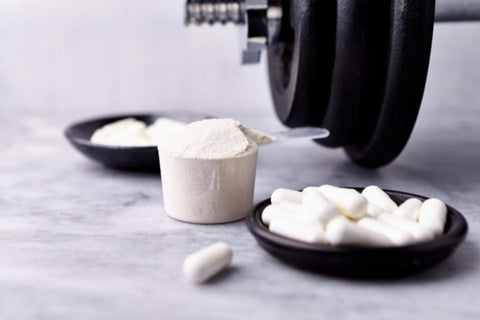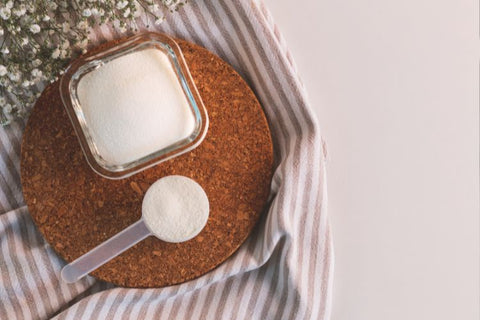When it comes to optimizing muscle growth and athletic performance, many fitness enthusiasts turn to supplements like creatine and protein powder. These supplements are well-known for their benefits, but their combination offers unique advantages that can significantly enhance results.
Below we’ll explore the compatibility, benefits, and studies supporting the synergistic effects of mixing creatine and protein powder.
Creatine vs. Protein Powder: Understanding Their Distinct Roles
Knowing the differences between creatine and protein powder is crucial for determining if you should use them individually or combine them.
Creatine: This supplement primarily focuses on enhancing short-burst, high-intensity activities like weightlifting and sprinting. It works by increasing the body's readily available energy stores (phosphocreatine) in muscle cells. This translates to several key benefits:
- Improved strength and power output: Creatine allows your muscles to exert more force during intense exercise.
- Faster recovery: By replenishing energy stores quicker, creatine helps you recover between sets or workouts more efficiently.
Protein Powder: This supplement provides a concentrated source of protein, essential for building and repairing muscle tissue. It offers distinct benefits:
- Supporting muscle growth and repair: This is particularly important after resistance training when muscles are breaking down and require amino acids for rebuilding.
- Promoting satiety: Protein can help you feel fuller for longer, potentially aiding in weight management goals.
Mixing Creatine and Protein Powder
Mixing creatine and protein powder is generally considered safe and compatible and there is no scientific evidence suggesting that combining them hinders the effectiveness of either supplement. They work on independent metabolic pathways but their functions remain unaffected when taken together.
Benefits of combining them:
- Efficiency: Combining them saves time and simplifies your post-workout routine. You only need to prepare one shake instead of two separate drinks.
- Taste: Creatine often has a bland or slightly bitter taste. Mixing it with protein powder can mask any unpleasant taste and make it more palatable.
- Nutrient Synergy: While not scientifically proven, some people believe consuming protein and creatine together might have a slight synergistic effect on muscle growth and recovery, though research is ongoing.
However, mixing them isn't necessary for their effectiveness. You can take them separately, and it won't diminish their benefits. Ultimately, the choice boils down to personal preference and convenience.
Muscle Benefits and Performance Enhancement
Combining creatine and protein powder potentially offers several muscle benefits and may contribute to improved athletic performance, although the extent of the combined effect is still being researched. Here's a breakdown:
Muscle Benefits:
- Increased Muscle Mass: Both creatine and protein powder can contribute to muscle growth. Creatine, by enhancing exercise performance and recovery, allows for more intense workouts, leading to greater muscle adaptations. Protein powder provides readily available amino acids, the building blocks for muscle tissue repair and growth.
- Improved Muscle Strength and Power: Creatine directly increases energy availability in muscles, enhancing strength and power output during high-intensity activities like weightlifting and sprinting. While protein powder doesn't directly impact power, it supports muscle growth, which can indirectly contribute to increased strength over time.
- Faster Muscle Recovery: Creatine may reduce muscle soreness and fatigue after exercise, promoting faster recovery between workouts. This allows for more frequent training sessions, further contributing to muscle growth and development. Protein powder provides a readily available source of amino acids needed for muscle repair and recovery after exercise.
Athletic Performance Enhancement:
- Strength and Power Improvement: The combined effects of creatine and protein on muscle strength and power can translate to improved performance in sports that rely on these qualities, such as weightlifting, powerlifting, and sprinting.
- Enhanced Work Capacity and Endurance: Creatine's ability to improve energy availability during high-intensity exercise can also benefit athletes in sports requiring repeated short bursts of intense activity, such as interval training or team sports like basketball and soccer.
- Faster Recovery Between Training Sessions: Faster muscle recovery facilitated by both creatine and protein allows athletes to train harder and more frequently, potentially leading to faster overall improvement.
Solubility and Convenience
Solubility refers to the ability of a substance to dissolve in a liquid (like water) to form a uniform solution. Both creatine and most protein powders are highly soluble in water, making them easy to mix. This allows for a convenient way to consume both supplements in a single shake.
Here's a breakdown of the solubility of creatine and protein powder:
-
Creatine: Creatine monohydrate, the most common form of creatine, has moderate solubility in water. At room temperature, you can dissolve approximately 14 grams of creatine per liter of water. It might take a bit of stirring to get it fully dissolved.
-
Protein Powder: Protein powders can have varying solubilities depending on their source and type:
-
Whey protein: This popular option generally has good solubility and dissolves easily.
-
Casein protein: This type tends to be less soluble than whey and might form a slightly thicker consistency.
-
Plant-based proteins: The solubility of plant-based protein powders can vary depending on the specific protein source.
Post-Workout Timing
After a tough workout, your body is primed for repair and growth. Fueling it with the right nutrients at the right time can make a significant difference in your athletic performance and recovery. Here's why consuming a mixture of creatine and protein post-workout can be particularly beneficial, and why this timing is important:
- The "Anabolic Window:" After a workout, your muscles are depleted and in a primed state for repair and growth. This period, often referred to as the "anabolic window," is characterized by increased sensitivity to nutrients.
- Muscle Protein Synthesis (MPS): This is the process of building new muscle tissue. During the anabolic window, MPS is elevated, meaning your muscles are more efficient at utilizing amino acids from protein to rebuild and grow.
- Creatine Uptake: Research suggests that creatine uptake might also be enhanced post-workout due to increased blood flow to the muscles. This means more creatine reaches your muscles when you need it most.
The Bottom Line: Taking creatine and protein immediately after your workout capitalizes on this heightened muscle receptivity, maximizing nutrient delivery for optimal recovery and potential muscle growth.
Synergy in Muscle Protein Synthesis
Protein powder provides essential amino acids, which, when combined with creatine, can enhance the overall availability of these building blocks for muscle protein synthesis.
- Specific Amino Acids: Certain amino acids play a crucial role in muscle building. Leucine, in particular, is a primary trigger for muscle protein synthesis. Protein powders, especially whey protein, tend to be rich in leucine, ensuring a good supply for this critical process.
- Energy Demands of Muscle Building: Muscle protein synthesis is an energy-intensive process. Creatine supports this process indirectly by keeping ATP levels high. This ensures that sufficient energy is available for protein synthesis, allowing your body to efficiently utilize the amino acids you provide for muscle growth.
- Potential Cellular Enhancement: Some research suggests that creatine might encourage cellular changes that promote muscle protein synthesis. While the exact mechanisms are still being studied, there may be a direct signaling effect within muscle cells that enhances their ability to utilize amino acids for repair and growth.
Overall: Consuming protein and creatine together works in several ways:
- Direct Supply: Protein powder provides a concentrated dose of essential amino acids, including those critical to MPS.
- Energy Optimization: Creatine ensures energy availability so the body can focus on using amino acids for building, not burning them for immediate fuel.
- Potential Signaling: Creatine might directly stimulate muscle cells, increasing their capacity to utilize the provided amino acids.
Key Takeaways
- Understanding the distinct roles of creatine and protein powder is crucial for optimizing their benefits.
- Mixing creatine and protein powder is safe and compatible, offering convenience and potentially enhancing muscle growth and recovery when consumed together.
- Both supplements dissolve well in water, making mixing easy for a single shake.
- Combining creatine and protein powder simplifies the supplement routine, aids recovery, and enhances athletic performance.
- Consuming them together post-workout maximizes nutrient delivery during the body's heightened muscle receptivity phase, optimizing muscle growth and repair.
- The synergy between protein powder and creatine enhances muscle protein synthesis, contributing to improved muscle growth and recovery.






